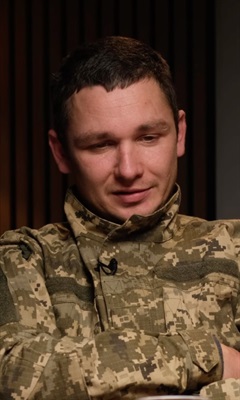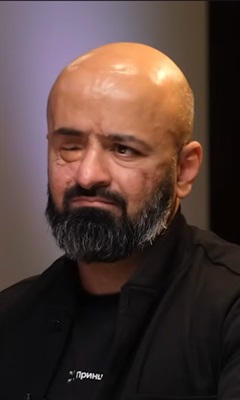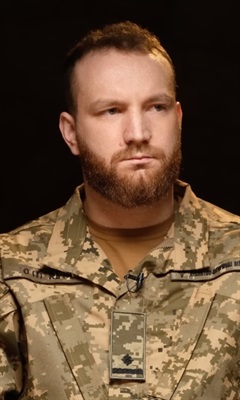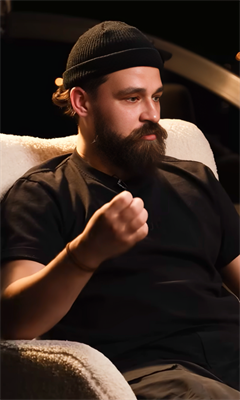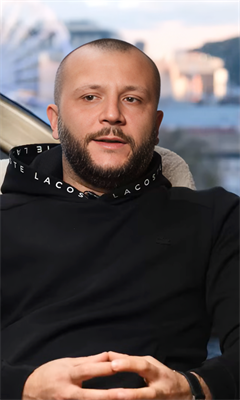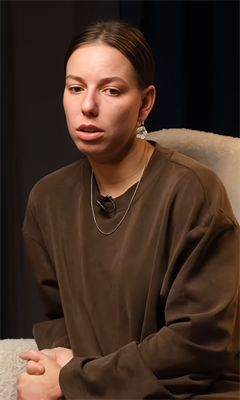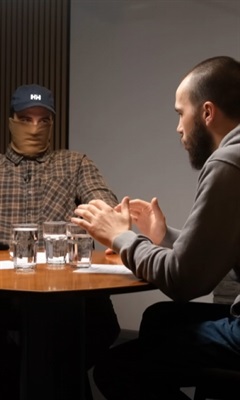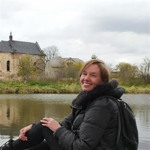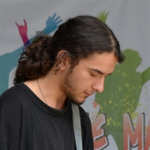She stayed alive under the shelling. Anastasia Volkova, a reporter, shows Luhansk region on fire
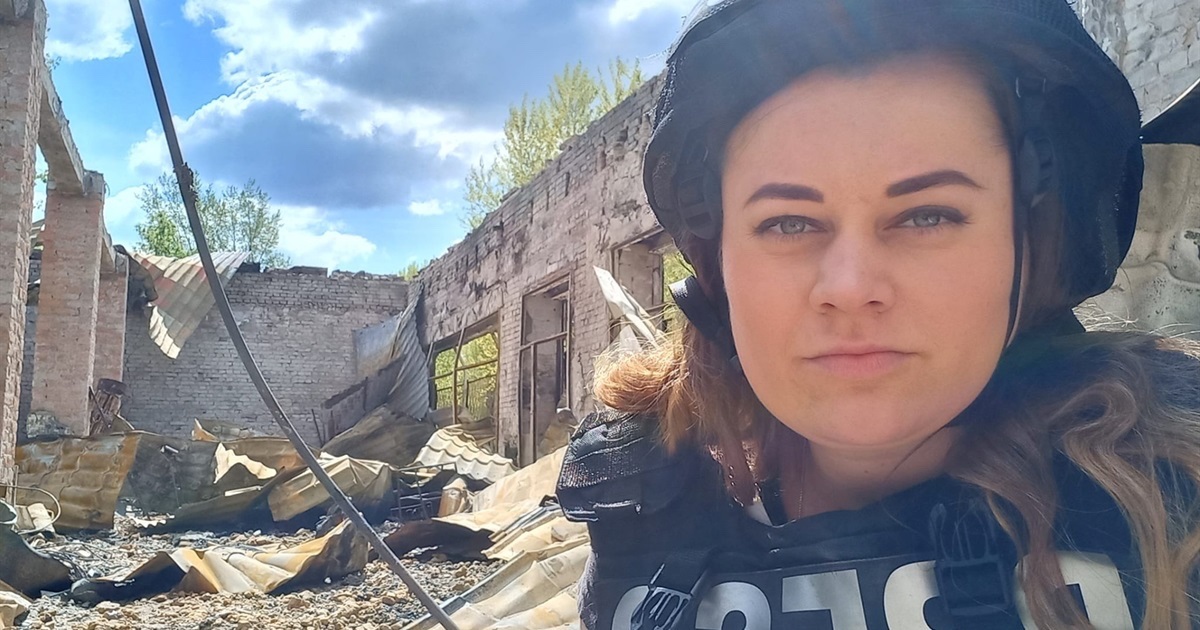
About risks
On the days before May 9, the Russian troops were shelling the towns and cities of the Luhansk region even more fiercely and mercilessly. I was just leaving my regular rotation in Severodonetsk when the orcs [Russians] hit the oil-processing plant in Lysychansk again.
Well, here it is, burning, how can I miss filming it? It is another evidence of what the Russians are doing in our territory. This is my job.
On that day, May 7, I got under shelling, stayed safe in life and limb, and even recorded a stand-up against the background of the burning oil-processing plant.
My friends worry about me, dye their gray hair, and check that I always have bulletproof vests, emergency kits, helmets, food, water, power banks, and everything needed for work.
About journalism and the beginning of the war
I am from Schastia, Luhansk region, I grew up in Luhansk. After 2014, I got my first TV job in Severodonetsk. Before that, I had worked in Internet media for two years, but these eight years, I have been focusing on the news. I am a journalist by training. I graduated from the East Ukrainian Volodymyr Dahl National University in Severodonetsk. This is the town where I continue working for different TV channels. Now my primary place of work is DOM TV channel and the international broadcasting platform, UATV.
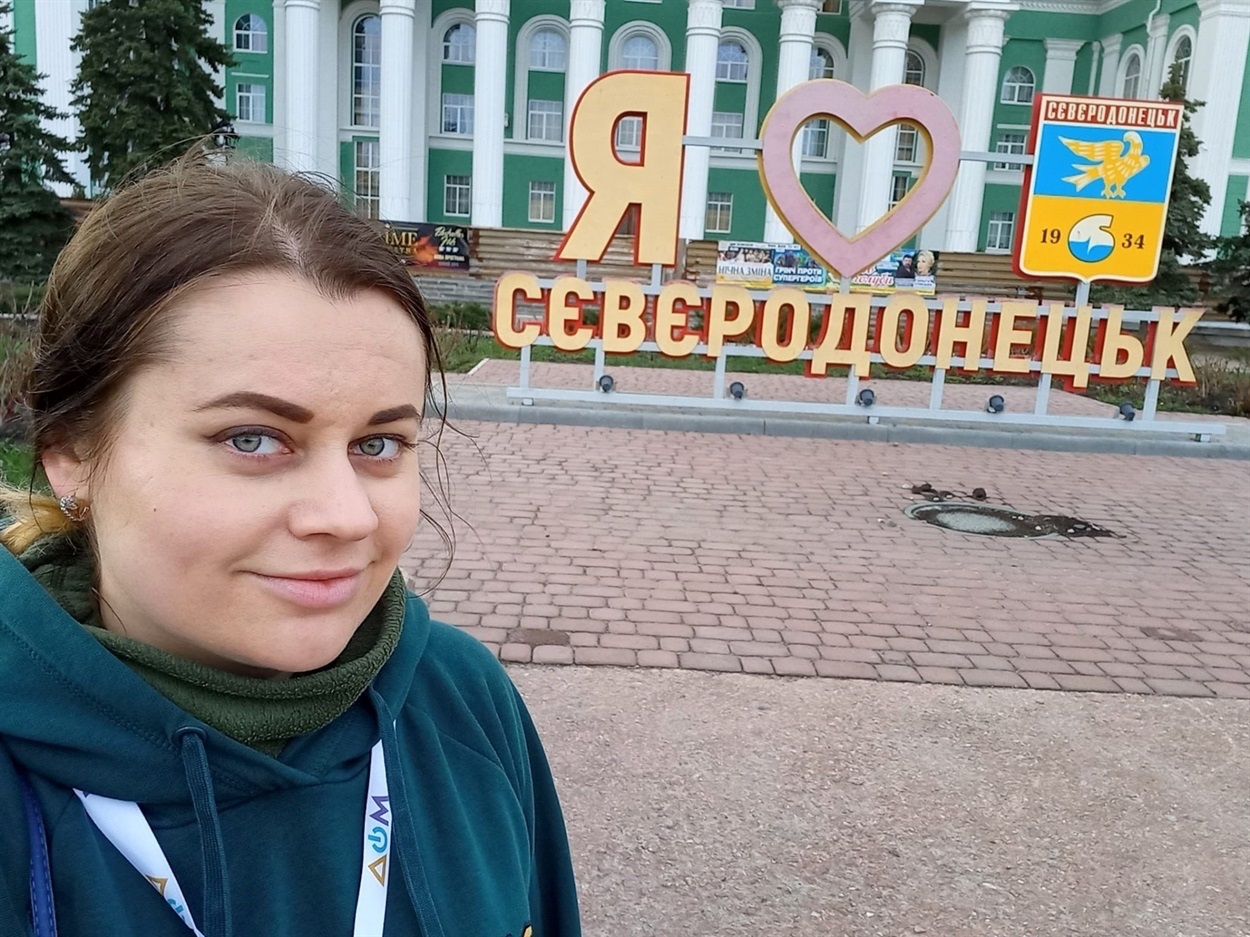 Working as a journalist for DOM TV channel. Photo: Courtesy of Anastasia Volkova
Working as a journalist for DOM TV channel. Photo: Courtesy of Anastasia Volkova
On the day of Russia’s attack against Ukraine, my friend from Priamyi channel in Kyiv called me at 05:00 a.m. She said that the war had broken out. I heard the sounds of explosions in the background during her call. About half an hour later, the first explosions sounded in Severodonetsk.
I stayed in the town for as long as possible – over a month, but due to personal health-related reasons, I had to go to Dnipro with my cat and a parrot entrusted to my care, although I didn’t really want to leave. I wanted to stay in Severodonetsk. Yet I continue working in this city because I don’t see myself outside of this conflict, outside of military journalism and the events in Donbas.
Now I am the only local journalist still going to Severodonetsk, but there are also the film crews of 1+1 and Inter TV channels as well as international reporters. I keep going there because in these eight years, Severodonetsk has become my home town, the town where I would like to stay, to throw in my lot. This is my home, and I can’t but keep going home. I am annoyed by this situation, by the Russian army trying to “liberate” me from my sweet home for the second time. I will keep going there because I can’t do otherwise.
About volunteering and people
I came to the volunteering center, set up at the Ice Sports Palace in Severodonetsk, to shoot some footage. They were distributing humanitarian aid to people in need, and I understood that I wanted to help. I saw good people and felt comfortable around them. Volunteering helps take your mind off the war for at least some time, to establish communication. I realized that I could be helpful here, i.e., I could do both journalism and, for instance, pack those bags with humanitarian aid and take them to people in need.
The situation I remember most vividly was when I got down to another basement and saw a family with a three-week-old baby living there. It was the fifth week of the war, and I realized that this baby was born in the basement. In his three weeks of life, he has not seen sunshine even once. I was full of rage and desire to tell about the events happening in Severodonetsk, about all the atrocities of the invaders.
Covering news till the last moment, till our victory
The second thing I remember the most is the fire. An apartment building was burning. I saw a woman burning and her daughter crying with my own eyes. There were many negative emotions. I realized I could do nothing to help, and I also realized that as a journalist, I had to ask questions about what was happening. But as a human being, I realized that I couldn’t do it. It was a great dissonance – you can’t break in two and don’t know what the right thing to do is. What matters more for you, to be a human being or a journalist?
About sleeping in the hallway
Since 2014, I have been working on the frontline, and I know very well what explosions are like. I also understand that the basements of Severodonetsk are not really suitable shelters. If the building is hit, the basement will not save people. My apartment is located in a place where the airstrikes do not really pose a threat. I found that sweet spot in the middle, not having to go down in the basement and be around the panic-mongers, because this was the only way to keep my sanity, which is vital under the shelling. I needed to stay cool, act quickly and thoughtfully, not giving way to any panic. People in the basements are usually panic-mongers, who don’t differentiate between the outgoing and incoming volleys and their targets. So, I slept in the hallway of my apartment.
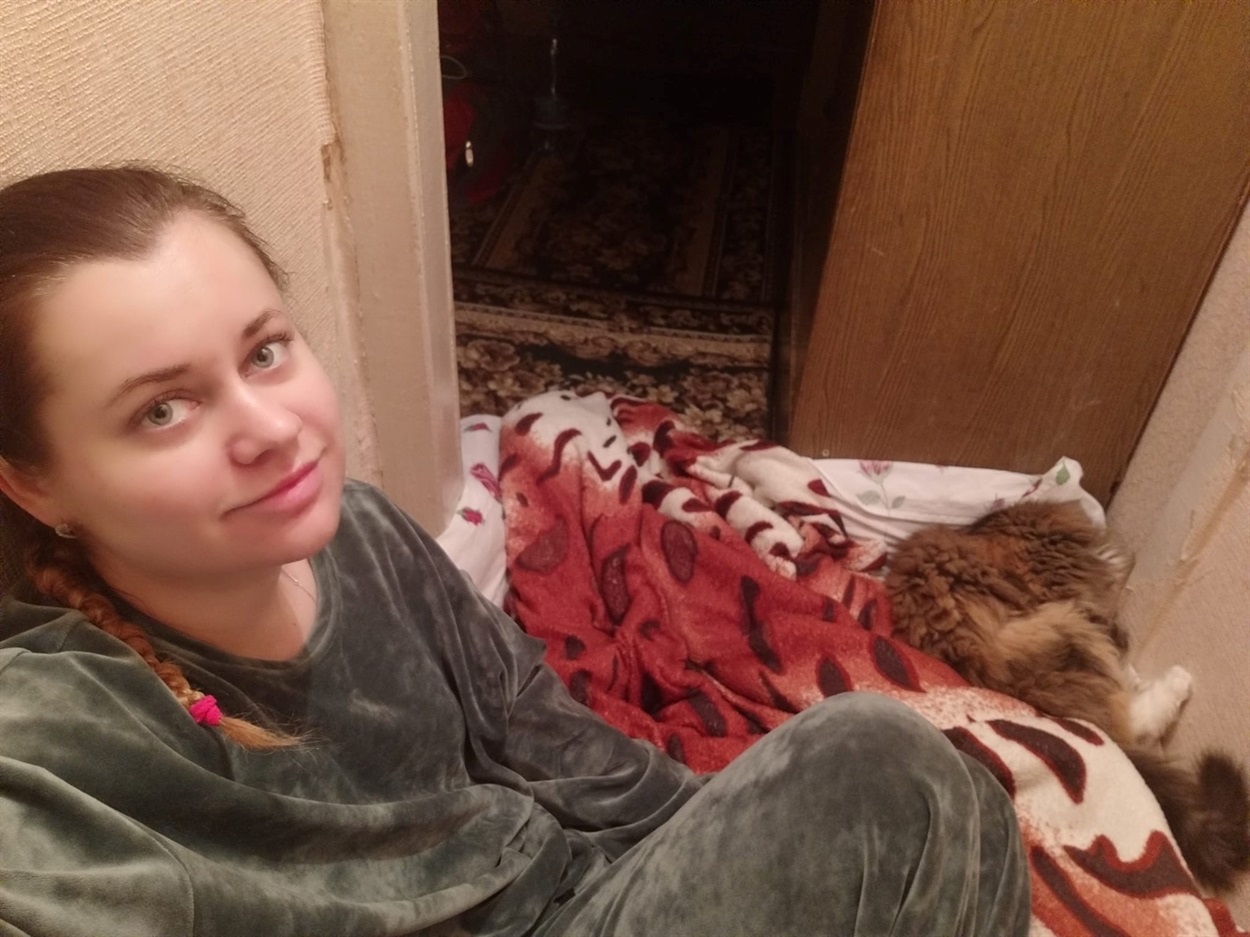 Photo: Courtesy of Anastasia Volkova
Photo: Courtesy of Anastasia Volkova
Besides, I had everything I needed at home. 2014 taught me to stock up on everything I can. I was not deprived of food; even before February 24, I understood that it was going to be bad. The years of living in Donbas taught me to be a thrifty raccoon, always stocking up on food products and cereals for the coming month, so I was never hungry. I also stocked up on water ahead of time. After surviving hunger once, I promised myself never to go hungry again. I always have a few bags of buckwheat, a few bags of bulgur, and so on. And I had candles in case there was no electricity.
Again, 2014 taught me a lot. Besides, I could take some food from the volunteers’ headquarters and get some water at school. Cat food was the biggest problem. To get it, I stood in line at the only remaining shop for 4-5 hours. In addition, the volunteers from Dnipro gave away some pet food. I used to upload my videos via mobile Internet in high-rises, 9-storied apartment buildings. That’s where I sent my footage from.
About the most horrible day and night in my life
My most horrible night was in December of 2014. I asked my mother to go to our relatives for some time while I came to Schastia because I knew that looters were raiding the district and wanted to keep my apartment safe. I stayed there for a night, and that’s when severe shelling began.
At that time, I didn’t quite understand what to do during shellings, bombardments, and destruction during the war. That night, my district was hit severely; they targeted my house precisely. I stayed in the bathroom all the time, and when I came out in the morning, I saw that the neighboring house section wasn’t there anymore; it had merely collapsed. I didn’t know how to act; I was just in fear and panic, and I didn’t understand what to do.
And the most horrible day was during the liberation of the town. It happened in summer. I went to get some water for the umpteenth time (the water supply system had not worked for a long time) and saw many dead bodies. These were just torn-off parts of bodies: arms, legs, brains. I didn’t know who they were – separatists or Ukrainians. I only saw rot and felt this stinking in the street.
Now my mother is safe. I got her out of Schastia on February 22.
About the guys on the zero mark
Before February 24, I used to shoot a lot on the zero mark. Now we keep in touch. I talk to many who have become my friends then. One man was wounded; he is in hospital now – a piece of a tank shell passed through his right temple and got stuck in his jaw. He has had a number of surgeries, and he is holding on, but the situation is very complicated.
I made many friends in Popasna, Novooleksandrivka, Katerynivka. We call or write to each other from time to time to find out how everyone is. Frankly speaking, I understand that they don’t tell me everything, to spare my feelings because I’m a girl. In reality, everything is very bad, and they don’t want to upset me.
About news and dreams
Frankly speaking, I am not afraid of what is happening. When I read the news, I do it as a journalist, not as a layman; there should not be any place for fear. You should evaluate all the events from the standpoint of your profession. Even my dreams are based on this principle: I dream about shooting footage of our victory and entering Luhansk together with our tanks.
As for my own footage, I know that people write all kinds of comments. I try not to respond and even not to read them because I get upset easily, so I try not to pay attention to such stuff.
About colleagues
I don’t condemn my colleagues for leaving for some reason or not going to the Luhansk region. Everyone has their own point of fear. A man I used to work with, a cameraman, went to his family in Germany, and I understand that I can’t condemn people who are in different circumstances. For instance, he has four children. How can I blame him?
The same is true for my other colleagues. Everyone has their own reasons. I have been by myself since 2014; I am a master of my own life, I have neither children nor a husband, so I can pull myself together and do what I do, not thinking that others will worry about me.
About victory
I believe in our victory. I will definitely go to Luhansk on a tank. I will definitely be the first to shoot footage to show that the war in Severodonetsk has ended, that Luhansk has been freed. And as for forecasts, I can’t say anything. I want all this to finish by summer, but I don’t know how it will actually happen. I am not a politician to give any forecasts; I am a journalist who covers what has already happened. And I can’t tell the future.





